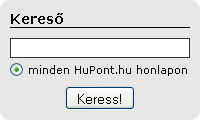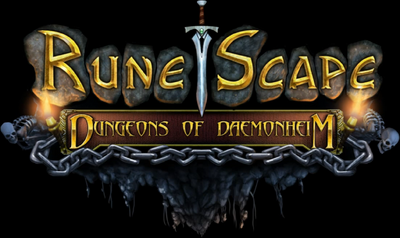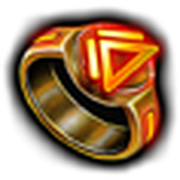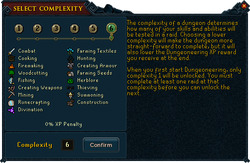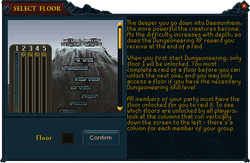Runescape egy kis segitség
Itt egy csomo dolgot meg tanulhatok bár nem biztos:)
Dungeoneering is a skill that was released in RuneScape on 12 April 2010 that is open to both free players and members. It features a castle named Daemonheim, which contains 35 underground floors. There, players explore and use other existing skills to clear each level, which involves finding keys, fighting monsters, and solving puzzles involving a wide variety of skills. Unlike other skills, players may venture under the castle in groups of up to five people. Additionally, players may earn a small amount of experience in other skills by accomplishing various tasks. Similar to other skills upon release, players cannot use experience lamps, penguin points, or Tears of Guthix to level up Dungeoneering until two weeks have passed since the skill's release.
The skill is trained entirely within Daemonheim - essentially an alternate portion of Gielinor into which almost no external items can be taken and none can be removed. It is heavily dependent on other skills trained outside of Dungeoneering. The items and skilling materials used within Daemonheim are all different and the game is group-oriented rather than being individual-oriented (although it is possible for players to train by themselves). In addition, players can train Dungeoneering past level 99 all the way to level 120, with over 104 million experience. This new maximum level is called "True Skill Mastery" as opposed to "Skill Mastery" (which is achieved at level 99). The current minimum requirement to be ranked (at approximately rank 56,900) is level 30.
Contents[show] |
wgAfterContentAndJS.push(function() { if (window.showTocToggle) { window.tocShowText = "show"; window.tocHideText = "hide"; showTocToggle();}});
Travel
Players may make their way to Daemonheim by one of three methods:
- Take a ferry from the dock behind Al Kharid bank.
- Venture through the deep Wilderness to the eastern part.
- Teleport using the Ring of Kinship given by the Dungeoneering Tutor at Daemonheim.
If using the ferry, players must walk from the Eastern side of the peninsula North-West to the central part of the castle.
Starting a Dungeon
At Daemonheim
There is a Dungeoneering tutor and a Fremennik Banker standing at the entrance to the castle. Players who are new to the skill or who have lost the Ring of kinship should speak to the tutor to obtain one. To gain access to Daemonheim, it is necessary to bank ALL worn items and all items carried, with the exception of the Orb of oculus and the Ring of kinship. All armour, weapons, runes, ammunition, and other supplies will be provided inside the dungeon.
After players have received a ring and banked all their items, they may proceed into the castle courtyard.
In the courtyard, there are three energy barriers that players can go through:
- Left barrier
- 'Free-for-all' barrier
- Right barrier
The left and right barriers are provided for players who would like to venture alone. To pass through these barriers, players have to use their ring of kinship to set the settings before going through. In the central 'Free-for-all' barrier, players are automatically teamed up to form a party. If there are no other suitable adventurers waiting, the player will be allowed to enter the dungeon by themselves. Players should ensure that their companion list is empty before going in, or they will be rejected.
Complexity
Complexity is a 6-tier scale that determines the number of other skills involved. Note that lower tiers will incur a penalty on the amount of experience gained at the end of a level as shown in the screenshot to the right. Each additional complexity level involves all skills from the level before plus some more; complexity level 6 includes every skill.
Floors
Floor levels, from 1 to 35, and the combat levels of party members determine the combat levels of the monsters that players encounter; the higher the floor level, the higher the combat of the monster. Players may only select the level based on half of their Dungeoneering level rounded up, provided that they have also cleared all levels previous to the one they select. If players are in a group, the floors other members have cleared would also be shown on separate columns. The highest floor accessible to a group is the highest floor accessible to the player with the lowest Dungeoneering.
Starting out
The main purpose is to progress through the various floors of the dungeon with teammates and kill the boss monster at the end of each level. To do so, players must travel through a series of rooms while using their collective skills to equip themselves and their teammates with items that will help you to complete the level. Therefore, teamwork and division of labour may help in achieving better results and efficiency.
Finding a team:
- Nothing in the worn slots and inventory is allowed, except the Ring of kinship and Orb of oculus.
- Familiars and Pets are not allowed either. If your familiar was carrying anything when last summoned, it will have to be re-summoned and those items banked, otherwise you will not be allowed to enter.
- When finding a team, many players use abbreviations. The abbreviation for Floor (Dungeon level) is 'F', while the abbreviation for Complexity is 'C'. For example, a player forming a team may say: F20 C6, meaning floor 20 at level 6 complexity. But the people who want to be invited to a party, add the 'Inv'-word in the beginning. For example Inv F15 C6 means that that player wants to be invited in a party that goes to the 15th Floor and at 6th Complexity.
During gameplay
- After going into the entrance, players will be first transported to a room with armours, weapons and food according to the difficulty they have selected. The team is linked by a Ring of kinship, which brings up an extra interface pane in the bottom right hand window, allowing sharing of experience, monitoring of team status, and visibility of other players' inventory, stats, and worn items.
- Dropped items do not vanish as they normally do in RuneScape. This includes monster drops as well as inventory management drops and drops on quitting (which are visible to others and may be picked up).
- When typing in public chat while in a dungeon, all messages are visible to everyone in a party regardless of where a player is.
- Rooms of the dungeon are connected by doors. It is impossible to see into the next room until the door is opened.
- Upon death, players will respawn in the starting room with the smuggler, and their death counter will be increased by one. All items are kept on death, however Gatestones that are in the players inventory will be dropped in place.
Ending a Dungeon
A Dungeon ends when you or your teammates enter the ladder behind the boss. For tips on defeating the boss, see Bosses
Titles
After the floor has been completed, titles are awarded to some of the players, giving no extra experience. See Titles for a full list.
Ending a raid and starting another
A raid is finished when the boss is defeated, and only then may the next raid be started. When the boss has been killed, a ladder to the next level appears on the wall. Additionally, at the end of each floor, one player will receive a random item. These items are often more powerful than ones dropped in the dungeon, and they may be worth binding.
You will advance to the next floor if your Dungeoneering level is high enough. Otherwise, the same floor will be repeated. In addition the complexity will also be increased (unless you are already on Complexity 6).
As soon as one person clicks on the ladder to leave the dungeon, a time based on the number of people in the party will start to count down. If every member of the party elects to leave, the dungeon finishes instantly.
Binding Items
No items may be brought to the next level, with the exception of bound items. When an item is bound, it appears in the player's starting inventory and a (b) is appended to the item's name. The number of items a player may have bound at once depends on his/her Dungeoneering level. Players with 1 Dungeoneering may only bind 1 item or 150 of a single stackable item. At level 50, 2 items may be bound, at level 100, 3 may be bound, and at level 120, 4 items may be bound.
In addition, you may always bind one type of rune or arrow, and up to 125 of these will be kept in your starting inventory. Since all other items and coins are lost at the end of a level, it is worth replenishing stock of bound ammunition (arrows or runes) up to the 125 that can be kept, and ensuring that the best equipment is kept.
Attempting to bind more items than a player can will do nothing, except elicit a message stating that a currently bound item must be destroyed before another item may be bound.
Weapon poison (of any strength) can be added to a bound dagger or spear, but cannot be added to bound arrows - you have to poison the arrows first and then bind them. Any cloth in Daemonheim can be used like a Cleaning cloth elsewhere to remove poison from a weapon. This allows you to replace a weak weapon poison with a stronger one.
Bound items can be sold.
Skills
Every skill can be used in some way while raiding the dungeons. They can give advantages, such as access to bonus rooms, or are sometimes necessary to complete a dungeon. The uses of skills while in a Dungeon are unique to Daemonheim.
For a descriptive list of the skills and their uses in the Daemonheim, see Dungeoneering Skills List
| Skill | Description |
|---|---|
| Attack | To increase the chance of doing damage to the monsters and bosses, if using melee. Also makes you able to wield better weapons. |
| Agility | To bypass certain obstacles in the dungeons. |
| Constitution | To be able to withstand more hits from the powerful monsters and bosses, and therefore survive longer in the dungeons. |
| Construction | To repair broken doors that can't be opened. |
| Cooking | Used to cook raw fish on a fire or range to prepare food that can be used to heal. |
| Crafting | To make ranged and magic armour from raw materials. Also used to fix pulleys in broken doors so that you can open them, and to craft stone weapons for statues so you can pass the room. |
| Defence | Lowers the chance of getting hit by the monsters and bosses, as well as makes you able to wield better armour. |
| Farming | Allows players to grow food and potion ingredients in farm patches. |
| Firemaking | To set fire to branches, allow you to cook food on them. Also used to burn log piles blocking doors so you can open them. |
| Fletching | Used to make bows, arrow shafts, staves and hunter traps. |
| Fishing | To collect raw food from fishing spots located around the dungeon. Also used for certain puzzles. |
| Herblore | Used to create potions from ingredients bought/found in the dungeons, also used to open doors. |
| Hunter | To allow the player to set traps made with the Fletching skill. |
| Magic | To allows players to dispel the locks on certain doors that cannot be unlocked with the coloured shapes found throughout the dungeons, as well as its normal use in combat. |
| Mining | Used to harvest ore from rocks, used in some events to mine stone from rubble. |
| Prayer | For exorcising dark spirits from certain doors so that you may pass through them, as well as its normal use in combat. |
| Ranged | Allows you to wield better bows and armour, and increases the damage when using ranged in combat. Ranged is also used in some puzzles. |
| Runecrafting | To craft runes to be used in spells. Also used in puzzles to activate crystals, and to imbue rune energy into doors so that you can open them. |
| Slayer | For slaying some special creatures that require a slayer level, and have special drops. |
| Smithing | To turn ore into melee armour, melee weapons and arrow tips, or create tools for harvesting raw material. Also used to repair keys for some doors. |
| Strength | Increases the damage you do when using melee to fight the monsters and bosses. |
| Summoning | To infuse and summon familiar pouches, allowing them to fight for you through the dungeon. Also used to dismiss rogues blocking some doors. |
| Thieving | Used to open some chests which contain items and opening certain doors. |
| Woodcutting | To cut wood from various trees and growths around the dungeon. Also used to chop away planks blocking doors so you can open them. |
Food
Most food available in the dungeon is fish, cave potatoes, and mushrooms.
As you progress through the dungeon, you will be able to grow and cook cave potatoes, which you can then combine with fish to form more complex foods.
For example, Cave potatoes and mushrooms are grown in a farm patch and take about 1 minute to grow. To cook them you need a cooker, some logs, and a tinderbox OR just logs and a tinderbox. (Unlike on the surface, potatoes can be cooked over ordinary fires.) Use the logs with the range and then the potatoes with the range. Then add the fish, and/or your choice of mushrooms. There are two kinds of mushroom, Gissel and Edicap, the latter requiring a Farming level of 68. For example, a Gissel and Salve eel potato will heal 260 LP, whereas the Salve eel itself heals 200 LP.
A complete experience table for Cooking, complete with life points for the potatoes can be found at Cooking.
Combat
Main article: Armour and weapons
Combat while Dungeoneering consists of the three attack types: Ranged, Magic, and Melee. Magic only allows a few spells out of the regular RuneScape spellbooks, with some additional spells only found in the dungeon.
Spellbook
Main article: Magic
The spellbook contains a combination of the Lunar and Standard spellbook spells. There are three new spells which help a player teleport around while Dungeoneering: Dungeon Home Teleport, Create Gatestone, and Gatestone Teleport.
Puzzles
Main article: Puzzles
Bosses
Main article: Bosses
For guidance on how to defeat individual bosses, click on their name.

| Floor Type | Boss Name | Dungeoneering Level Required | Known Floors | Note |
|---|---|---|---|---|
| Frozen | Gluttonous Behemoth | 1 | 1-11 | Heals by eating nearby carcasses. Stand in front of them to prevent this. Its weakness is crush. |
| Astea Frostweb | 1 | 1-11 | Summons Ice Spiders, switches between all three protection prayers and can use ice barrage. Her weakness is range. | |
| Icy Bones | 1 | 1-11 | Creates damaging stalagmites around the room that block movement, stand next to him to avoid. | |
| Luminescent Icefiend | 6 | 3-11 | Calls forth a barrage of icicles that must be avoided. | |
| Plane-freezer Lakhrahnaz | 12 | 6-11 | Players must slip across ice to reach the boss, who pushes them away. | |
| To'Kash the Bloodchiller | 18 | 9-11 | Freezes the player and then shatters the ice for increased damage. | |
| Abandoned | Divine Skinweaver | 24 | 12-17 | Heals player during the Skeletal Horde boss. |
| Skeletal Horde | 24 | 12-17 | Skeletons keep spawning until you block off their entrance routes. | |
| Hobgoblin Geomancer | 24 | 12-17 | Nullifies prayers and teleports around the room. | |
| Bulwark beast | 24 | 12-17 | Armour must be broken with a pickaxe before it can be damaged by melee or range. | |
| Unholy cursebearer | 30 | 15-17 | Reduces the player's combat stats. | |
| Furnished | Rammernaut | 36 | 18-26 | Occasionally charges at the player reducing defence and nullifies prayer. |
| Stomp | 36 | 18-26 | Rocks fall from the ceiling which players must avoid while collecting lodestones. | |
| Har'Lakk the Riftsplitter | 36 | 18-26 | Drains prayer and creates portals with stat reduction, poisoning and damaging effects. | |
| Lexicus Runewright | 40 | 20-26 | Deflects up to 1/3 melee damage that you deal, summons books that attack with mage, range, and melee. | |
| Sagittare | 46 | 23-26 | Has protect from range, teleports across the room, and sometimes makes the player unable to run. | |
| Night-gazer Khighorahk | 52 | 26 | Periodically has an attack that smashes the ground and knocks back the player if too close. | |
| Abandoned 2 | Shadow-forger Ihlakhizan | 60 | 30 | Periodically sends out a force that reduces target's stats dramatically if hit. |
| Bal'lak the Pummeller | 66 | 33-35 |
Rewards
Main article: Rewards
Upon completion of a dungeon raid, players will receive Dungeoneering skill experience and a number of tokens equal to 1/10 of the experience received, rounded down. These tokens are smuggled outside of Daemonheim so that they may be traded with the rewards trader in the Daemonheim camp for items to be used outside of the dungeons.
Quests Providing Dungeoneering Experience
For two weeks after the release of Dungeoneering, no quests or reward lamps will offer Dungeoneering experience. Once those two weeks have elapsed, you will be able to gain Dungeoneering experience from quest lamps and other experience-giving items.
Journal
While Dungeoneering, one can find parts of different journals usually after a boss is defeated; they can be viewed by right clicking the Ring of kinship, then selecting "Open journal".
Music
Main article: Music
Controversy
In the wake of its release, there was debate about whether Dungeoneering was really a skill or rather just an activity similar to a minigame. Many players felt that Dungeoneering did not meet certain requirements to fulfil the definition of a skill. The reasons given for this include the inability to take any items outside of the dungeons, the fact that it is dependent upon many other skills, the limitation of its training to only one area, and the lack of integration with the rest of the game. Since Dungeoneering was in development for a long time - with the players aware of its development for many years of that time - much hype was built up (usually in the form of threads in the Future Updates forum). When Dungeoneering was finally released, it may not have been what some people had hoped for.
Free players are also at a disadvantage when training Dungeoneering, as the highest level free-to-play equipment is fractite, while members have access to much better equipment. Also, many former members playing in free-to-play worlds were upset that they had to unequip their skillcapes in order to train the skill, making it so that they must renew their membership in order to equip their skillcapes again.
Glitches
Unfixed
- If you use Gatestone Teleport and to get out of a bosses room it will try to get to you in any room of the dungeon.
- Free players can't set the skill as an objective; it is considered members-only by the Objectives system.
- If a player does not progress through the dungeon fast enough, an unlocked door will re-lock itself, possibly making it impossible to proceed through the dungeon.
- Sometimes the entire game window goes black while in a dungeon. Reverting the size of your game screen usually helps.
- Sometimes the entire game window goes white while in a dungeon. There is nothing that can be done to continue the progress.
- If a player talks to the Fremennik captain outside the Al Kharid bank while playing as a female character, the warrior would call you "Sir."
- On the Dungeoneering guide, Floor 18 has the same colour of the abandoned floors but actually is part of the furnished floor series.
- If a player log out in some places, you will be inside a staircase and you must walk out to get out, people have been reported and mods muted because they thought they no-clipped.
- When eating a raw cave potato the player reports that they have eaten a baked cave potato even though it is not cooked.
- Clicking on the life points globe near
Honlapkészítés ingyen:
Ez a weblapszerkesztő alkalmas
ingyen weboldal,
ingyen honlap készítés...
Mai: 21
Tegnapi: 13
Heti: 34
Havi: 696
Össz.: 63 137
Látogatottság növelés
Runescape egy kis segitség - © 2008 - 2026 - rhharcos.hupont.hu
